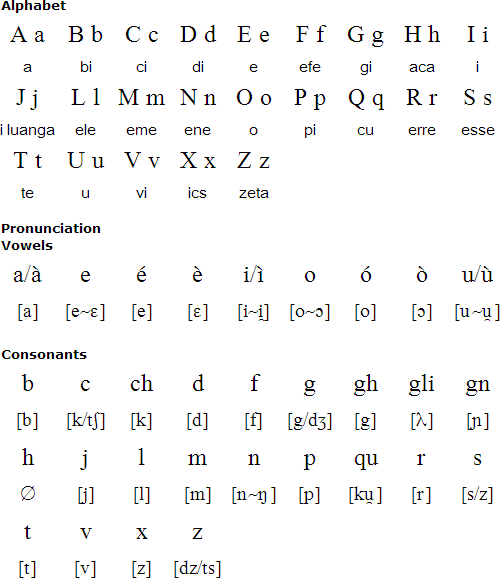Istriot is a Romance language spoken in the south west of the Istrian Peninsula in Croatia by about 400 people, especially in Rovinj and Vodnjan. It is thought to be related to Ladin, which was spoken across a region from Friuli in northern Italy, through eastern Switzerland to Istria until the year 1000 AD.
Istriot is variously classified as an independent Northern Italian language, a Rhaeto-Romance language, an Italo-Dalmatian language, or a Romance language indigenous to Istria with influences from Venetian, Friulian and Slavic languages. When Istria was part of the Kingdom of Italy, Istriot was viewed as a dialect of Venetian.
In Istriot, the language is named after the six towns where it is spoken: Bumbaro in Vodnjan, Vallese in Bale, Rovignese in Rovinj, Sissanese in Šišan, Fasanese in Fažana, and Gallesanese in Galižana. The name Istriot was coined in the 19th century by Graziadio Isaoa Asoli, an Italian linguist.

La nostra zì oûna longa cal da griebani: i spironi da Monto inda uò salvà, e 'l brasso da Vistro uò rastà scuio pei grutoni pioûn alti del mar, ca ruzaghia sta tiera viecia-stara. Da senpro i signemo pissi sensa nom, ca da sui sa prucoûra 'l bucon par guodi la veîta leîbara del cucal, pastadi dala piova da Punente a da Livante e cume i uleîi mai incalmadi. Fra ste carme zì stà la nostra salvissa, cume i riboni a sa salva dal dulfeîn fra i scagni del sico da San Damian; el nostro pan, nato gra li gruote, zi stà inbinideî cul sudur sula iera zbruventa da Paloû... e i vemo caminà par oûna longa cal da griebani, c'ancui la riesta lissada dali nostre urme.
Ours is a long road strewn with stones: the Monto spurs they saved, and the Vistro arm remained rock for the caves placed higher up the sea, which erodes this ancient land. It has always been fish that alone procure the morsel to enjoy the free gull life, oppressed by Western and Eastern rain as olives without grafts. Among these inlets was our salvation, like the bream are saved by the dolphin among the dens of the San Damiano dry; our bread, born among the caves, was blessed by the sweat farmyard seething Palù... and we walked for a long bumpy road, which today remains leveled by our steps.
Information supplied by Michael Peter Füstumum
Information about Istriot | Numbers
Information about the Istriot language
https://en.wikipedia.org/wiki/Istriot_language
http://www.ethnologue.com/18/language/ist
Aragonese, Aranese, Aromanian, Asturian, Catalan, Corsican, Dalmatian, Emilian-Romagnol, Extremaduran, Fala, Franco-Provençal, French, Friulian, Galician, Gallo, Gascon, Genoese, Guernésiais, Istro-Romanian, Istriot, Italian, Jèrriais, Ladino, Ladin, Ligurian, Lombard, Lorrain, Megleno-Romanian, Mirandese, Moldovan, Monégasque, Mozarabic, Neapolitan, Occitan, Occitan (Auvergnat), Occitan (Languedocien), Occitan (Limousin), Occitan (Provençal), Picard, Piedmontese, Portuguese, Romanian, Romansh, Sardinian, Sicilian, Spanish, Valencian, Venetian, Walloon
Languages written with the Latin alphabet
Page last modified: 09.06.24
[top]
You can support this site by Buying Me A Coffee, and if you like what you see on this page, you can use the buttons below to share it with people you know.

If you like this site and find it useful, you can support it by making a donation via PayPal or Patreon, or by contributing in other ways. Omniglot is how I make my living.
Note: all links on this site to Amazon.com, Amazon.co.uk
and Amazon.fr
are affiliate links. This means I earn a commission if you click on any of them and buy something. So by clicking on these links you can help to support this site.
[top]